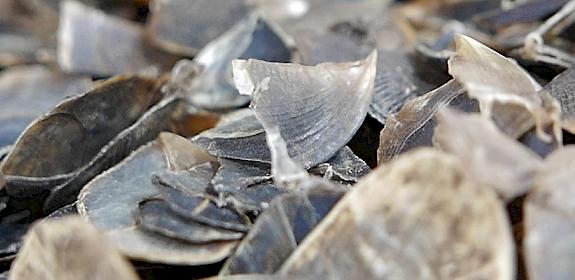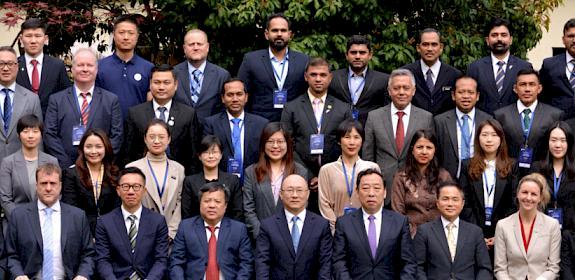Malaysia makes third major pangolin scale seizure in a month
Update 16th June: On 15th June, Malaysian Customs officers seized a further shipment of 393.5 kg pangolin scales, also arriving by air from Ghana and falsely labelled as oyster shells.
Kuala Lumpur, Malaysia, 13th June 2017–For the third time in just over a month, Malaysian authorities have seized a large shipment of pangolin scales inbound from Africa. This latest seizure brings the total weight of confiscated scales so far to a tonne.
Although Malaysia was specified as the final destination, the address in Ampang listed on the airway bill was found to be fake, said Dato’ Paddy Bin Abd Halim, Malaysia’s Customs Assistant Director General for Enforcement, at a press conference today.
No arrests have yet been made and investigations continue under Section 135 (1) (a) of the Customs Act 1967.
Last year, TRAFFIC and the University of Adelaide published a study that confirmed the widely-agreed consensus of a dramatic switch from Asian to African pangolin species in trade over a 38-year period between 1977 and 2014. Analysis showed that 79% of the scales recorded in trade since 2010 were from African pangolins.
“Malaysian Customs has intercepted an alarming volume of wildlife contraband from Africa since April this year, and for this we congratulate them,” said Kanitha Krishnasamy, Senior Programme Manager for TRAFFIC in Southeast Asia.
However, multiple shipments comprising of rhino horns, pangolin scales and live Critically Endangered tortoises – all of them listed in CITES Appendix I – entering Malaysia signifies a very worrying pattern; that traffickers feel they can continuously move their contraband through the country
Kanitha Krishnasamy, Senior Programme Manager for TRAFFIC in Southeast Asia
On 2nd May Customs officers at the same airport seized a 408kg shipment from Ghana that transited through Dubai on its way to Kuala Lumpur. A second shipment weighing 304kg from Democratic Republic of Congo that passed through Kenya and Dubai was seized just two days later in Kuala Lumpur. In the previous month, Customs seized 18 rhino horns from Mozambique.
Dato’ Paddy told reporters that although two of the shipments came from Ghana, it did not necessarily mean they were both from the same sender or syndicate.
“We hope this level of enforcement effort will continue,” said Dr Chris R. Shepherd, Regional Director for TRAFFIC in Southeast Asia. “More importantly, investigative work at national and international levels needs to be stepped up to put the perpetrators behind these transactions out of business for good.”
Pangolins are among the most trafficked mammals in the world and the scales remain in high demand for use in traditional medicines, especially in China.
Due to the tremendous pressure from illegal trade, over 180 nations at the CITES[1] summit in Johannesburg, South Africa, in 2016 agreed to a ban of the international trade in all eight pangolin species by listing them on CITES Appendix I.
Notes:
[1] CITES is the Convention on the International Trade in Endangered Species of Wild Fauna and Flora




